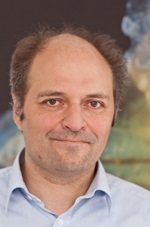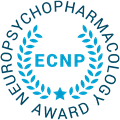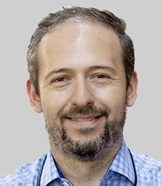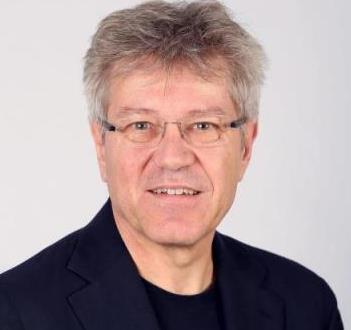Plenary lectures
We will again have six plenary lectures as part of the scientific programme. Our confirmed line-up:
PL01 — The neurobiology of play
Michael Brecht, Germany
Sunday 16 October, 12.15-13.00
 Michael Brecht grew up in Muenster, Germany and started to study biochemistry at the University of Tuebingen. He soon became interested in animal behavior and did a one-year internship at Hubbs Sea World Research Institute, San Diego on sperm whale bioacoustics. Thus, he decided to finish in biology rather than in biochemistry. His diploma work with Bruno Preilowski and Michael Merzenich at the University of California San Francisco was concerned with rat vibrissal behaviors. Subsequently, he did a PhD in the lab of Wolf Singer on the role of synchronization of neural activity in the superior colliculus in the control of eye movements. After his PhD he felt that we would not succeed in understanding population activity without an improved knowledge about cellular computations in vivo. He therefore joined Bert Sakmann’s lab as a postdoc to do in vivo whole-cell recordings in rat barrel cortex. From there he went first to Erasmus University, Rotterdam to become an assistant professor and then to Humboldt University of Berlin, where he became a full professor of animal physiology/systems neurobiology and neural computation.
Michael Brecht grew up in Muenster, Germany and started to study biochemistry at the University of Tuebingen. He soon became interested in animal behavior and did a one-year internship at Hubbs Sea World Research Institute, San Diego on sperm whale bioacoustics. Thus, he decided to finish in biology rather than in biochemistry. His diploma work with Bruno Preilowski and Michael Merzenich at the University of California San Francisco was concerned with rat vibrissal behaviors. Subsequently, he did a PhD in the lab of Wolf Singer on the role of synchronization of neural activity in the superior colliculus in the control of eye movements. After his PhD he felt that we would not succeed in understanding population activity without an improved knowledge about cellular computations in vivo. He therefore joined Bert Sakmann’s lab as a postdoc to do in vivo whole-cell recordings in rat barrel cortex. From there he went first to Erasmus University, Rotterdam to become an assistant professor and then to Humboldt University of Berlin, where he became a full professor of animal physiology/systems neurobiology and neural computation.
Michael Brecht is particularly interested in the question of how neuronal activity triggers behaviour. He has demonstrated that even the stimulation of one nerve cell can trigger motor behaviour. In 2012 he was awarded the Leibniz Prize, the most prestigious research award in Germany.
PL02 — Nutritional psychiatry – where are we going?
Felice Jacka, Australia
Sunday 16 October, 17.00-17.45
 Felice Jacka OAM is Professor of Nutritional Psychiatry and Director of the Food & Mood Centre at Deakin University. She is founder and president of the International Society for Nutritional Psychiatry Research (ISNPR) and immediate past president of the Australian Alliance for the Prevention of Mental Disorders (APMD). Professor Jacka has pioneered and led a highly innovative program of research that examines how individuals’ diets interact with the risk for mental health problems. Her current work focuses closely on the links between diet, gut health and mental and brain health. This research is being carried out with the ultimate goal of developing new, evidence-based prevention and treatment strategies for mental disorders. Professor Jacka is an ISI Highly-Cited Researcher (2020 and 2021), putting her in the top 0.1% of publishing scientists worldwide. She has recently published a book for the general public called ‘Brain Changer’ through Pan Macmillan Australia and Yellow Kite in the UK and EU. Her children’s book – There’s a Zoo in my Poo – was published in July 2020. In 2021 she was awarded a Medal of the Order of Australia (OAM) in the Queen’s Honours for her contribution to Nutritional Psychiatry research.
Felice Jacka OAM is Professor of Nutritional Psychiatry and Director of the Food & Mood Centre at Deakin University. She is founder and president of the International Society for Nutritional Psychiatry Research (ISNPR) and immediate past president of the Australian Alliance for the Prevention of Mental Disorders (APMD). Professor Jacka has pioneered and led a highly innovative program of research that examines how individuals’ diets interact with the risk for mental health problems. Her current work focuses closely on the links between diet, gut health and mental and brain health. This research is being carried out with the ultimate goal of developing new, evidence-based prevention and treatment strategies for mental disorders. Professor Jacka is an ISI Highly-Cited Researcher (2020 and 2021), putting her in the top 0.1% of publishing scientists worldwide. She has recently published a book for the general public called ‘Brain Changer’ through Pan Macmillan Australia and Yellow Kite in the UK and EU. Her children’s book – There’s a Zoo in my Poo – was published in July 2020. In 2021 she was awarded a Medal of the Order of Australia (OAM) in the Queen’s Honours for her contribution to Nutritional Psychiatry research.
Felice talked about nutritional psychiatry with ECNP press officer Tom Parkhill.
Read the interview
PL03 — ECNP Neuropsychopharmacology Award Plenary Lecture — The psychobiology of exhaustion
Marie Åsberg, Sweden
Monday 17 October, 12.15-13.00

 Marie Åsberg’s career spans over half a century at Stockholm’s Karolinska Institute, where, in addition to holding a professorship in psychiatry from 1984, she has held multiple leadership positions. In that time she has made multiple pioneering contributions that have fundamentally shaped the field of neuropsychopharmacology.
Marie Åsberg’s career spans over half a century at Stockholm’s Karolinska Institute, where, in addition to holding a professorship in psychiatry from 1984, she has held multiple leadership positions. In that time she has made multiple pioneering contributions that have fundamentally shaped the field of neuropsychopharmacology.
Her record of remarkable achievement began with her dissertation work on the influence of plasma concentrations on the effectiveness of antidepressant drugs. She demonstrated that, for this class of drugs, treatment guided by dose rather than by plasma concentration resulted in suboptimal treatment. She also established a genetic basis of this variability, laying the groundwork for subsequent research, and identifying functional genetic variation in CYP2D6 and other metabolic enzymes as important biological moderators of treatment responses.
Read the press release
More about this award
PL04 — Novel insights into immune-brain interactions
Jonathan Kipnis, USA
Monday, 17 October, 17.00-17.45
 Dr. Jonathan (Jony) Kipnis’s research group focuses on the complex interactions between the immune system and the central nervous system (CNS). The goal is to elucidate the cellular and molecular mechanisms underlying these interactions in neurodegenerative, neurodevelopmental, and mental disorders as well as in physiology (including healthy aging).
Dr. Jonathan (Jony) Kipnis’s research group focuses on the complex interactions between the immune system and the central nervous system (CNS). The goal is to elucidate the cellular and molecular mechanisms underlying these interactions in neurodegenerative, neurodevelopmental, and mental disorders as well as in physiology (including healthy aging).
Kipnis’s research team showed that the brain function is dependent, in part, on the function and integrity of the immune system and that immune molecules (cytokines) can play neuromodulatory roles. The fascination with immunity and its role in neurophysiology is what brought the team to a breakthrough discovery of meningeal lymphatic vessels that drain the CNS into the peripheral lymph nodes and thus serve as a physical connection between the brain and the immune system. This finding challenged the prevailing dogma of CNS being an “immune privileged organ” and opened new avenues to mechanistically study the nature of neuroimmune interactions under physiological and pathological conditions. The implications of this work are broad and range from Autism to Alzheimer’s disease through neuroinflammatory conditions, such as Multiple Sclerosis.
Dr. Kipnis graduated from the Weizmann Institute of Science in Israel, where he was a Sir Charles Clore scholar and a recipient of distinguished prize for scientific achievements awarded by the Israeli Parliament, The Knesset. In 2018 he received a prestigious NIH Director’s Pioneer award to explore in more depth neuro-immune interactions in healthy and diseased brain.
PL05 — Brain Prize Lecture — Circuits for locomotor movement in health and disease
Ole Kiehn, Sweden
Tuesday, 18 October, 12.15-13.00
 Ole Kiehn graduated in medicine and is Doctor of Medical Science from the University of Copenhagen, Denmark. He is a currently Professor in Integrative Neuroscience at the Department of Neuroscience, University of Copenhagen and Professor in Neurophysiology at the Department of Neuroscience, Karolinska Institutet, Sweden. Ole Kiehn studies the organization of neuronal circuits that execute movements. His lab has employed and developed electrophysiological approaches in combination with genetic and optical technologies to enable cellular and circuit-level analysis of spinal and brain motor circuits. His work has identified key elements of spinal circuitries necessary for producing changes in timing and coordination of locomotion. Work from his lab has also delineated the diversification of brainstem circuits involved in the episodic expression, like start, stop and turning of locomotion or context-dependent selection of locomotor behaviour. The work links neuronal circuit organization to behaviour and demonstrates translational potential in the development of therapies for movement disorders caused by spinal cord injury or motor disease like Parkinson.
Ole Kiehn graduated in medicine and is Doctor of Medical Science from the University of Copenhagen, Denmark. He is a currently Professor in Integrative Neuroscience at the Department of Neuroscience, University of Copenhagen and Professor in Neurophysiology at the Department of Neuroscience, Karolinska Institutet, Sweden. Ole Kiehn studies the organization of neuronal circuits that execute movements. His lab has employed and developed electrophysiological approaches in combination with genetic and optical technologies to enable cellular and circuit-level analysis of spinal and brain motor circuits. His work has identified key elements of spinal circuitries necessary for producing changes in timing and coordination of locomotion. Work from his lab has also delineated the diversification of brainstem circuits involved in the episodic expression, like start, stop and turning of locomotion or context-dependent selection of locomotor behaviour. The work links neuronal circuit organization to behaviour and demonstrates translational potential in the development of therapies for movement disorders caused by spinal cord injury or motor disease like Parkinson.
 Ole Kiehn is one of the winner of The Brain Prize 2022, the world’s largest brain research prize, awarded annually by the Lundbeck Foundation. Each year, they award 10 million DKK (approx. 1,3 million EUR) to one or more neuroscientists who have made a ground-breaking impact on brain research. The Brain Prize was first awarded in 2011 and has so far honoured 34 scientists from 9 different countries.
Ole Kiehn is one of the winner of The Brain Prize 2022, the world’s largest brain research prize, awarded annually by the Lundbeck Foundation. Each year, they award 10 million DKK (approx. 1,3 million EUR) to one or more neuroscientists who have made a ground-breaking impact on brain research. The Brain Prize was first awarded in 2011 and has so far honoured 34 scientists from 9 different countries.
More info
PL06 — Stress and perinatal mental health – from mechanisms to clinical practice
Carmine M. Pariante, United Kingdom
Tuesday 18 October, 15.55-16.40
 Carmine M. Pariante is Professor of Biological Psychiatry at King’s College London, and Consultant Perinatal Psychiatrist at the South London and Maudsley NHS Foundation Trust. He investigates the role of stress and inflammation in the causes and treatments of mental disorders, both in the laboratory and in clinical studies.
Carmine M. Pariante is Professor of Biological Psychiatry at King’s College London, and Consultant Perinatal Psychiatrist at the South London and Maudsley NHS Foundation Trust. He investigates the role of stress and inflammation in the causes and treatments of mental disorders, both in the laboratory and in clinical studies.
His work focuses on depression and fatigue, with a particular interest in the perinatal period and in subjects with medical disorders. More recently, he has developed an interest in the effects of the arts, social prescribing, and nutritional interventions, on mental health.
He has published more than 400 scientific papers, with a Google Scholar H-Index >100, and has received numerous awards for his research, including the 2012 “Academic Psychiatrist of the Year” Award from the Royal College of Psychiatrists and the 2017 NARSAD Distinguished Investigator Award, one of the most prestigious international research awards in psychiatry; he is also a Clarivate Analytics Highly Cited Researcher.
His dream is that new therapeutic tools targeting the stress and inflammatory systems will soon be available to alleviate the suffering of patients with mental health problems.
He appears regularly in international media outlets to discuss mental health issues, and can be followed on Twitter and Instagram as @ParianteLab and on the blog that he edits, www.inspirethemind.org.
Carmine talked about his life and work to ECNP press officer Tom Parkhill.
Read the interview